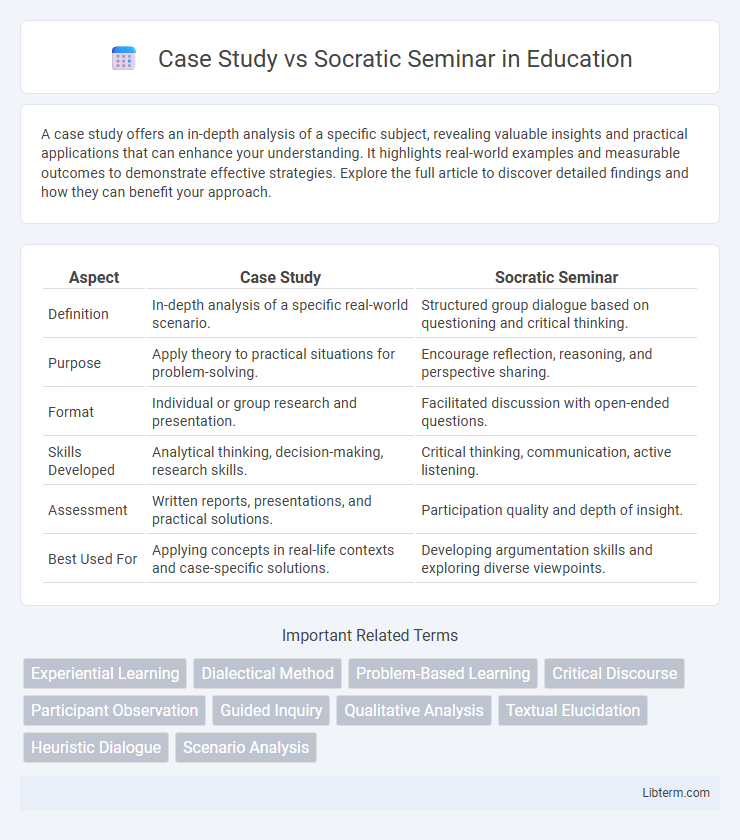A case study offers an in-depth analysis of a specific subject, revealing valuable insights and practical applications that can enhance your understanding. It highlights real-world examples and measurable outcomes to demonstrate effective strategies. Explore the full article to discover detailed findings and how they can benefit your approach.
Table of Comparison
| Aspect | Case Study | Socratic Seminar |
|---|---|---|
| Definition | In-depth analysis of a specific real-world scenario. | Structured group dialogue based on questioning and critical thinking. |
| Purpose | Apply theory to practical situations for problem-solving. | Encourage reflection, reasoning, and perspective sharing. |
| Format | Individual or group research and presentation. | Facilitated discussion with open-ended questions. |
| Skills Developed | Analytical thinking, decision-making, research skills. | Critical thinking, communication, active listening. |
| Assessment | Written reports, presentations, and practical solutions. | Participation quality and depth of insight. |
| Best Used For | Applying concepts in real-life contexts and case-specific solutions. | Developing argumentation skills and exploring diverse viewpoints. |
Introduction to Case Study and Socratic Seminar
Case Study methods immerse participants in detailed real-world scenarios to analyze complex issues, fostering practical problem-solving skills and critical thinking. Socratic Seminars engage learners through guided dialogue, encouraging open-ended questioning and deep exploration of philosophical or ethical topics. Both approaches emphasize active learning but differ in structure: Case Studies center on individual or group analysis of events, while Socratic Seminars prioritize collaborative inquiry and dialectical reasoning.
Defining the Case Study Approach
The Case Study approach involves an in-depth, contextual analysis of a real-life situation or problem, allowing learners to apply theoretical concepts to practical scenarios. This method emphasizes detailed examination of complex issues within their real-world context, fostering critical thinking and problem-solving skills. Unlike the Socratic Seminar, which centers on guided dialogue and questioning to explore ideas, the Case Study approach prioritizes data collection, analysis, and decision-making based on concrete evidence.
Understanding the Socratic Seminar Method
The Socratic Seminar method emphasizes dialogue-driven exploration where participants engage in critical thinking through open-ended questions, fostering deeper understanding by examining diverse perspectives. Unlike the case study approach, which involves analyzing specific scenarios to apply theoretical concepts, the Socratic Seminar prioritizes collaborative inquiry and reflective discussion. This method enhances comprehension by encouraging participants to articulate reasoning and challenge assumptions in a supportive learning environment.
Historical Origins and Educational Context
Case studies originated in legal and medical education in the late 19th century to provide practical problem-solving experiences, emphasizing real-world scenarios and applied knowledge. Socratic seminars trace back to the classical Greek philosopher Socrates, who used dialogue-based questioning techniques to develop critical thinking and ethical reasoning in learners through guided discussion. Both methods are utilized in modern education to foster analytical skills, but case studies center on individual or group analysis of specific situations, whereas Socratic seminars prioritize collective inquiry and dialectical engagement.
Key Objectives and Learning Outcomes
Case Study methods emphasize real-world problem-solving by analyzing specific scenarios, enhancing critical thinking and application of theoretical concepts. Socratic Seminar promotes deep understanding through guided questioning and dialogue, fostering critical reflection and communication skills. Both approaches develop analytical abilities but differ in focus: Case Studies target practical decision-making, while Socratic Seminars encourage exploration of ideas and reasoning.
Structure and Format Comparison
Case study discussions follow a structured format centered on analyzing real-life scenarios, starting with problem identification, data examination, and decision-making to arrive at practical solutions. Socratic seminars utilize a less formal, dialogue-driven structure that emphasizes open-ended questioning, critical thinking, and collective exploration of complex ideas without predetermined answers. While case studies rely heavily on tangible evidence and systematic evaluation, Socratic seminars prioritize intellectual inquiry and reflective discourse through iterative questioning.
Roles of Facilitators and Participants
Facilitators in case studies guide participants through real-world scenarios by providing structured frameworks and prompting critical analysis, while in Socratic seminars, they encourage open-ended questioning and foster dialogue without imposing answers. Participants in case studies analyze data, propose solutions, and apply theoretical knowledge to practical situations, whereas in Socratic seminars, they engage in thoughtful discussion, challenge assumptions, and collaboratively explore complex ideas. Both formats prioritize active participation, but the case study emphasizes problem-solving roles, and the Socratic seminar centers on inquiry and reflective thinking.
Advantages and Limitations of Each Method
Case studies offer in-depth analysis of real-world scenarios, promoting practical application and critical thinking, but can be time-consuming and may lack multiple perspectives. Socratic seminars encourage open dialogue and diverse viewpoints, enhancing critical questioning and deep understanding, yet may be dominated by vocal participants and depend heavily on facilitator skill. Both methods provide valuable learning experiences, with case studies focusing on application and Socratic seminars on exploration of ideas.
Ideal Use Cases in Academic Settings
Case studies are ideal for deep analysis of real-world scenarios, allowing students to apply theoretical concepts to practical situations, especially in disciplines like business, medicine, and law. Socratic seminars excel in fostering critical thinking and dialogue through open-ended questions, making them suitable for literature, philosophy, and ethics courses where discussion and multiple perspectives are valued. Combining both methods can enhance comprehensive learning by integrating analytical skills with reflective discourse in academic environments.
Choosing the Right Approach for Your Classroom
Choosing between case studies and Socratic seminars depends on your classroom goals and subject matter. Case studies promote practical application and critical thinking through real-world scenarios, ideal for business and health science courses. Socratic seminars enhance dialogue, deep reading, and analytical skills, making them suited for literature, philosophy, and social studies discussions.
Case Study Infographic

 libterm.com
libterm.com